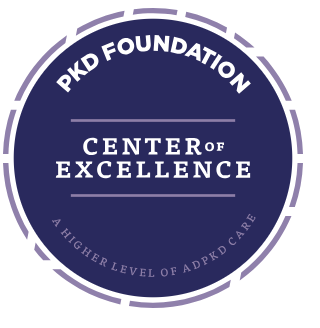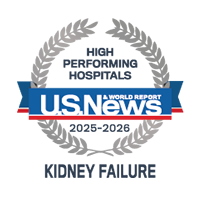
Polycystic Kidney Disease (PKD) Center of Excellence
The UCSF Polycystic Kidney Disease (PKD) Center of Excellence is dedicated to providing comprehensive, cutting-edge care to patients with polycystic kidney disease, or PKD. PKD is the fourth leading cause of kidney failure, and more than half of people with PKD will develop kidney failure by the age of 50.
Because PKD can affect many organ systems in addition to the kidneys, our center is experienced in navigating all medical conditions related to PKD. Our team includes experts from many different specialties – including nephrology, hepatology, cardiology, radiology, reproductive endocrinology and infertility, and maternal-fetal medicine – as well as a dedicated dietitian and genetic counselor. Our patients benefit from the most up-to-date diagnostic and treatment options, including advanced imaging technologies to monitor progression of the disease.
As a growing hub for PKD research, we are also working toward developing new therapies. Find out more about our clinical research.
Support us
Your contributions will help us realize our vision for this innovative PKD Center of Excellence and make considerable strides toward finding a cure for PKD.
To make a contribution, visit us here.
To find out more about giving opportunities, contact Craig Matthews, assistant director of development, at [email protected] or (415) 514-1137.
A gift of any size helps advance the center and provides important support for our most pressing needs. On behalf of the UCSF Division of Nephrology, thank you for your interest in our work.
Our locations
Our team
Clinical trials
Gram-Negative Bloodstream Infection Oral Antibiotic Therapy Trial
Each participant will be placed in 1 of 5 DOOR levels based on overall clinical response and treatment-related adverse events (AE). The 5 DOOR levels are as follows: successful clinical response and no treatment-related AE (Level ...
Recruiting
Hyperpolarized 13C Pyruvate MRI Scan in Predicting Tumor Aggressiveness in Patients With Renal ...
Descriptive statistics (mean, median, standard deviation, distribution, etc) of the metabolism measures will be calculated. The investigators will use a tree-based cross-validated Classification & Regression Trees (CART) model for...
Recruiting
Awards & recognition
-

Designated center of excellence
-

Rated high-performing hospital for kidney failure care
-

Among the top hospitals in the nation
Support services
Plan your visit
What to Bring
- Photo I.D.
- Health insurance card
- Insurance authorization, if required
- Doctor's referral, if required
- Recent test results related to your condition
- List of your medications, including dosages, plus any you're allergic to
- List of questions you may have
- Device or paper for taking notes
































